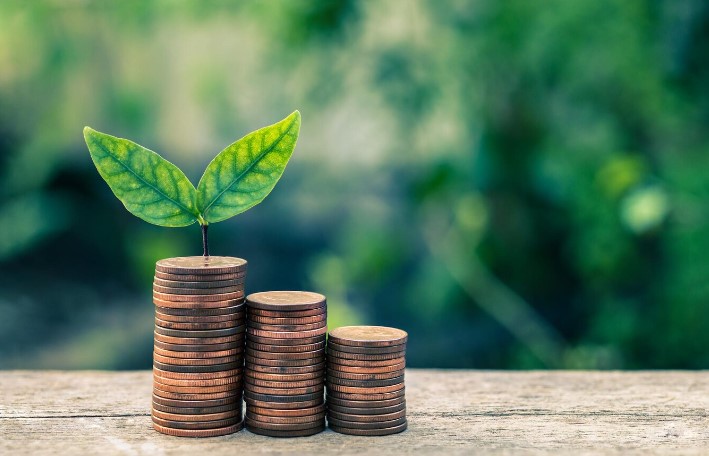India’s economic landscape is evolving, and green investments are becoming pivotal for a sustainable future. High-net-worth individuals (HNIs) have an excellent opportunity to support sustainable ventures through green investments facilitated by demat accounts. In this blog, we will delve into how HNIs can drive green investments, focusing on real-time data from the Indian market and key analysis.
The Rise of Green Investments in India
India’s green economy is growing, with the renewable energy sector leading the way. According to the Ministry of New and Renewable Energy (MNRE), as of March 2024, India’s renewable energy installed capacity stood at 174.53 GW, including 69.63 GW of solar and 45.42 GW of wind energy. The government aims to achieve 500 GW by 2030, providing a fertile ground for HNIs to invest in green ventures. This booming sector offers HNIs avenues to make high returns while contributing to a greener future.
India has also seen a surge in the issuance of green bonds. As of mid-2024, the green bond market has raised over ₹70,000 crore ($8.5 billion) from both government and private entities, which is a 20% increase from the previous year. Green bonds are issued to fund environmentally friendly projects, like renewable energy and sustainable infrastructure.
Green Investment Opportunities in India
- Renewable Energy: India is one of the fastest-growing renewable energy markets globally. As of 2024, companies like Adani Green Energy and Tata Power Solar are leading the sector. Adani Green Energy’s stock price, for instance, has surged by 35% in the last two years due to its growing renewable energy portfolio, making it an attractive option for HNIs to consider via their demat accounts.
- Electric Vehicles (EVs): The Indian EV market is predicted to grow at a CAGR of 49% from 2024 to 2030, driven by the government’s target of achieving 30% EV penetration by 2030. HNIs can invest in companies like Tata Motors, which has a 75% market share in the electric car segment, or smaller players like Ather Energy through venture capital options. Stocks related to EV components, such as battery manufacturers like Exide Industries, have shown a 15% increase in stock prices in 2024, providing lucrative returns.
- Green Bonds: Green bonds are increasingly being listed on Indian stock exchanges, allowing HNIs to directly invest through their demat accounts. The National Thermal Power Corporation (NTPC) has raised ₹4,000 crore ($500 million) through green bonds to finance solar and wind projects. These bonds typically offer a return of 6-8%, which is competitive compared to traditional fixed-income investments.
- Sustainable Real Estate: Real estate in India is gradually moving toward sustainability, with a focus on green buildings. Companies like Godrej Properties and Mahindra Lifespace are developing eco-friendly real estate projects certified by the Indian Green Building Council (IGBC). With rising demand for green living spaces, property prices in sustainable real estate projects have increased by 10-15% in recent years, making it a promising investment for HNIs through real estate investment trusts (REITs).
- Environmental, Social, and Governance (ESG) Funds: In the mutual fund space, ESG funds have become popular in India. ESG funds invest in companies with strong environmental practices. HNIs can access these funds via their demat accounts. For instance, the SBI ESG Fund, which has seen an annualized return of 12% in 2024, is an excellent choice for HNIs who want to incorporate sustainability into their portfolios.
The Role of HNI Demat Accounts in Facilitating Green Investments
HNIs can easily manage their green investments through demat accounts. The demat account acts as a one-stop platform for holding shares, green bonds, and mutual funds, providing transparency and flexibility.
- Access to Green Stocks: With real-time stock market data, HNIs can identify and trade shares of companies that are contributing to a sustainable future. For example, shares in ReNew Power, a leader in wind and solar energy, can be bought and sold electronically.
- Investment in Green Bonds: HNIs can buy green bonds through their demat accounts. These bonds are often issued via stock exchanges and offer attractive interest rates along with the peace of mind of contributing to environmental sustainability.
- Trading in ESG Mutual Funds: The rise of ESG funds on Indian stock exchanges allows HNIs to diversify their portfolios. Demat accounts allow easy access to ESG-focused funds like the Kotak ESG Opportunities Fund, which has delivered 10.5% returns over the past year.
- Participation in Green IPOs: Green companies like Adani Green Energy and ReNew Power have launched successful IPOs in recent years. With demat accounts, HNIs can participate in these IPOs seamlessly. Adani Green Energy’s IPO, launched in 2022, was oversubscribed by 80%, signaling the robust demand for green investments in India.
Government Policies Supporting Green Investments
India’s government is actively promoting green investments through various policies and incentives:
- Increased FDI Limits: The Indian government allows 100% Foreign Direct Investment (FDI) in the renewable energy sector, providing a massive boost to both local and foreign HNIs. This has led to a 25% year-on-year increase in FDI inflows into renewable energy, totaling $10 billion in 2024.
- Tax Benefits: Investments in renewable energy and ESG funds often come with tax exemptions or deductions. HNIs investing in green bonds can benefit from tax breaks under Section 80C, and green real estate projects can also provide deductions under income tax laws.
- Incentives for Renewable Projects: The Ministry of Power offers subsidies and financial support to renewable energy projects. This has attracted significant private investment, with HNIs playing a crucial role. The Indian government has also announced a production-linked incentive (PLI) scheme for the solar manufacturing sector, ensuring profitability for green investments.
Future Outlook: India’s Path Toward Sustainability
India is on a clear path toward sustainability, with renewable energy and green infrastructure being at the forefront of the nation’s development. As per the International Energy Agency (IEA), India’s renewable energy sector is set to attract investments worth $200 billion by 2030. For HNIs, this translates into ample opportunities for long-term financial growth while positively impacting the environment.
Additionally, the rise of carbon trading in India will further boost green investments. India launched its first carbon trading platform in early 2024, allowing companies to trade carbon credits, thereby incentivizing businesses to reduce emissions. HNIs can also invest in carbon credit projects or funds, which is expected to grow into a ₹2,000 crore market by 2026.
Bottom-Line : A Greener Future Through Strategic Investments
HNIs in India have a critical role to play in fostering a sustainable future through green investments. With a demat account, they can invest in renewable energy stocks, green bonds, ESG funds, and even participate in green IPOs. The Indian market, bolstered by government incentives and favorable policies, is ripe for eco-conscious investors.
By prioritizing green investments, HNIs not only ensure a stable return on their investments but also contribute to India’s mission of becoming a global leader in sustainability. Now is the perfect time for HNIs to leverage their demat accounts and invest in a greener tomorrow.








